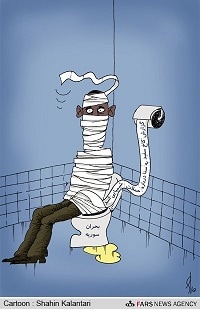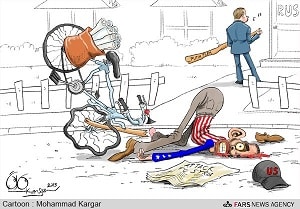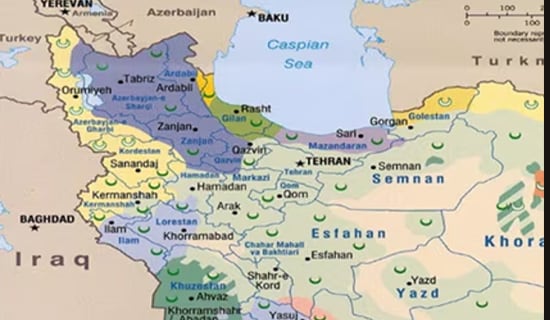U.S. President Obama's September 11, 2013 call for a pause in his request to the U.S. Congress to approve an attack on Syria so as to give the emerging Russian diplomatic initiative a chance was interpreted by Iranian regime spokesmen as a victory for the resistance axis headed by Tehran over the West and the U.S. It was also viewed by them as a manifestation of that axis' deterrent power vis-à-vis the weakening U.S., even though Iranian regime spokesmen chose to disregard the actual content of the Russian initiative, and its potential negative repercussions for Tehran. In addition, analysts in Tehran rejected President Obama's claim that the Syria agreement could be a model for a diplomatic initiative vis-à-vis Iran, and interpreted his backing down from his push for a military attack on Syria as proof that there was no need for Iran to compromise on its nuclear program.
Nevertheless, the Iranian website Mashregh, which is close to security circles in Iran, warned that the Syrian diplomatic initiative plays into Israel's hands, because it proves Israel's claim that Iran will back down on its nuclear program only if it, like Syria, fears imminent military attack. The website explained that with this initiative, Israel was freed from the threat of the use of Syrian chemical weapons against it and of the damage that it had anticipated from an attack on Syria, and that it had also been saved from the possibility of these weapons falling into the hands of Salafi circles if they succeeded Syrian President Bashar Al-Assad.
This report will review explanations in Iran as to why President Obama backed down from his intention to attack Syria.
Iranian Supreme Leader Ali Khamenei Welcomes Shift In U.S.'s Approach
In a September 11, 2013 speech, Iranian Supreme Leader Ali Khamenei welcomed President Obama's decision not to attack Syria, and expressed his hope that "the U.S.'s new approach regarding Syria is serious and is distant from political game-playing." He added, "If this is indeed the case, this means that the U.S. has backed down from its arbitrary and mistaken approach of recent weeks."[1]
IRGC Commander Ja'fari: The U.S. Has Been Defeated Yet Again By The Resistance
In a speech at the annual conference of Iran's Islamic Revolutionary Guards Corps (IRGC), on September 16, 2013, IRGC commander Mohammad Ali Ja'fari said: "The Islamic revolution is in very good shape, and it is witness to a series of defeats of the arrogance [i.e. the West, headed by the U.S.] in the face of the resistance front. As we see, in occupied Palestine, in Iraq, and in Lebanon, the resistance front of the Islamic Revolution continues overwhelmingly. The latest defeat of the enemy and of the arrogance [i.e. the U.S.] in the face of the resistance was in Syria. The scheme by which it sought to interfere militarily in Syria was defeated, and its main plan failed, as did its other plans – all while the enemy was saying, 'If we cannot overcome Syria we will not be able to overcome Iran." [2]
Majlis Members: The Expectation Of Half A Million Israeli Dead In An Attack On Syria Terrified The U.S.
In a September 11, 2013 interview with the Fars news agency, Majlis National Security Committee member Javad Karimi Qadoussi said: "The Americans noticed that Iran, as the key power in the region, is capable of vanquishing the U.S. in the Middle East, and that no power can ignore Iran's red lines... The Americans realized that at this stage it was better for them not to risk a crushing and historical defeat... The resistance's determination prevented the Americans from actualizing their intentions in the region, and this in itself is considered a great victory according to the regional resistance philosophy...
"The Americans knew that if they launched a military attack on Syria, the missiles of the resistance would strike their warships and missile ships in the Mediterranean, and even the occupied territory [i.e. Israel] would be subjected to a rain of missiles in the first days of the war. The expectation that half a million would be killed in the occupied territory in the first days of the war was very difficult for the Americans [to accept]."[3]
Kayhan: The U.S. Was Deterred By The Resistance Axis Headed By Iran, And Is Refraining From Attacking
Also on September 11, the Kayhan daily, which is close to Supreme Leader Ali Khamenei, claimed that the deterrent force of the resistance axis led by Tehran vis-à-vis had forced Washington to back down from its intention to attack Syria. The daily explained that the weakened U.S. had encountered a situation of a predetermined loss, because had it attacked Syria, it would have been defeated by the resistance. The newspaper also pointed out that the U.S.'s threat that it would attack Syria as a warning to Iran was only psychological warfare. The following are the main points of the Kayhan article:[4]
"On August 29, the U.S. was to launch a military attack on Syria... Obama had made this move conditional upon Congressional approval, and therefore this upsetting and tense issue, which was headlines worldwide, was delayed until September 9... But September 9 arrived and Obama... welcomed Russia's new proposal, that calls for placing Syria's arsenal of chemical weapons under U.S. oversight in order to prevent a military attack on [Syria].
"The meaning of these declarations by Obama was clear; they explicitly show that despite the storm that they evoked regarding the attack on Syria, the U.S. had backed down...Why did the U.S. twice, within less than 10 days, suspend its position and its decision regarding an attack on Syria, ultimately distancing itself from the war?
"Another point emanating from this question is the effort to depict a possible attack on Syria as a warning to Iran.
"The U.S. is in an economic crisis. Its data show that 50 million people in the U.S. are poor and have no medical insurance. The U.S. administration's budget deficit and debt have passed the $17 trillion mark. The combination of the gap between [rich and poor] and the social situation [there] has created security challenges... On the other hand, American public opinion is firmly opposed to their country's leaders launching another war...
"But the main issue is more important than the economic crisis and the challenge of American public opinion. The key point is that after beating the drums of war, boasting [of their strength], and assuming that they have no rival to confront, [it became clear] to the Americans [that they were facing] a reality that they could not deny, and realized from the messages conveyed to them regarding Syria that the ramifications of a war on Syria would exceed their expectations and assessments. It was the broad reaction of the resistance front that made Obama twice delay the war and forced him to back down from attacking Syria.
"Iran is the reason for all the U.S.'s problems in the region. Why is this? It is because Iran has overturned Washington's calculations. The clear and undeniable sign of this claim in the Syrian matter is Obama's backing down from the war, that [had already been] delayed at two stages in order to find a way to evade the war arena.
"With its media effort and psychological operations, the Americans are trying to link Syria to the issue of Iran, by clarifying that an attack on Syria is a warning to Iran. Is this claim compatible with the existing reality in the region and the problems and the crises in which the U.S. is embroiled? The answer to this is no, and the claim that an attack on Syria constitutes a warning to Iran is aimed at preparing a media atmosphere and unprofessional psychological warfare.
"There is evidence and there are signs that the Americans have encountered a headache of historic proportions. The result of this war drumbeat is a lose-lose game for the White House. Had it turned to war, the ramifications could not be predicted; the [U.S.'s] strategic fear [of Iran] and the deterrent capability of the resistance front that [Iran] heads led to [the U.S.'s] attempts to extricate itself from the maelstrom using various excuses, ostensibly in a dignified manner. [On the other hand,] had they backed down [from the intention to light] the fuse of war, as indeed happened, then the [real] bare and unbeautified face of the U.S. would be presented to world public opinion, much more clearly..."
Advisor To IRGC Commander: Iran Is The Focus Of Power That Paralyzes Enemies Of The Resistance
At a September 23, 2013 Basij conference, Saffar Harandi, advisor to IRGC commander Ja'fari, said: "Syria has for three years been entangled in a war that would wipe out any other country within a few months. But today Syria is stronger than before, by virtue of the backing of Iran, which is the focus of power that prevents the enemies of the resistance from doing anything... By virtue of the support of Iran and the Lebanese Hizbullah, Syria does not fall, and the superpowers are [themselves] acknowledging this."[5]
Kayhan Editorial Board Member: Obama Is Finding It Very Difficult To Form A Consensus On Attacking Iran
On September 18, 2013, Kayhan editorial board member Sadollah Zarei told the Fars news agency: "The U.S., as a superpower, has not managed to form a consensus or to persuade the international community regarding Syria... Obama's ability to form a consensus vis-à-vis Iran is even lower... Obama is forced to accept the Russian plan for Syria in light of the resistance front's response capability.
"The best response to Obama's declaration [that the Russian initiative is also implementable in Iran] is to carry on with Iran's [current] policy, which underlines our principled policy vis-à-vis the developments in the region, including in Syria."[6]

Obama on "Syria Crisis" toilet, tied up by "White House Report To Senate On Assad's Chemical Attack" paper[7]
Ahmad Vahidi: The U.S.'s Defeat On Syria – First In Series Of Its Defeats
Iranian Expediency Council member and former defense minister Ahmad Vahidi said on September 14, 2013: "The regime's position is to defend the resistance. Iran will provide countries on the line of resistance with political and spiritual support, as well as [any kind] of support we see fit. The Americans do not, and have never had, any reason to attack Syria, and that is why they could not implement their intention to attack it... They were going to attack Syria under the pretext of chemical weapons, but several countries formulated a clear plan to stop this.
"The U.S.'s current state indicates the defeat of its discourse, as evident from its failure to impose its will on other countries regarding the Syria situation. The defeat of the U.S.'s soft power in convincing other countries on the Syria matter will be the beginning of a series of failures suffered by the Americans. Iran's support of Syria is eternal. We support those on the frontlines of the resistance."[8]

Putin's initiative – a blow to Obama's intention to attack Syria[9]
Mashregh: The Russian Initiative Serves Israel
On September 16, 2013, the daily Mashregh stated: "Without paying the price of a military intervention in Syria, Israel disarmed Bashar Al-Assad, and reduced to a minimum the dangers it faces from the Salafis, who will be uncontrollable if they replace Assad. As a result, in its new scenario and [in light] of the disarmament of the Syrian government, Israel is [now] certain that no danger threatens it and will therefore aspire to continue [promoting] instability and civil war in Syria in various ways.
"For a while now, Israel and its accompanying lobby have been pressuring the U.S. and international institutions to intervene militarily in Iran. They planned this script as proof of their claim that the military option is the best option [in dealing with] the Iranian nuclear issue. In fact, with the Washington-Moscow agreement, Israel aspired to prove to the U.S. and to international institutions that Iran will only surrender if it feels that an attack [on it] is imminent, [and will back down] just as Assad backed down when he felt the chance for a war [on Syria] was serious..."[10]

Putin overrules Obama[11]
[1] Leader.ir, September 11, 2013.
[2] Fars (Iran), September 16, 2013.
[3] Fars (Iran), September 11, 2013.
[4] Kayhan (Iran), September 11, 2013.
[5] Mehr (Iran), September 23, 2013.
[6] Fars (Iran), September 18, 2013. Basij commander Mohammad Reza Naqdi claimed on September 14, 2013 that Tehran had managed to talk the U.S. out from its intention to attack Syria and stated: "Iranian diplomacy is undoubtedly effective, and strengthens the motivation of the resistance [axis] in the region. Syria has many weapons and even if its chemical weapons are taken away, Israel will not be safe." Tasnim (Iran), September 14, 2013.
[7] Fars (Iran), September 11, 2013.
[8] Mehr, Tasnim (Iran), September 14, 2013.
[9] Fars (Iran), September 14, 2013.
[10] Mashregh (Iran), September 16, 2013.
[11] Fars (Iran), September 14, 2013.








